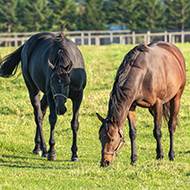Vets express concern over cheap wormer promotion

"It is exceedingly disappointing to see de-wormers being advertised in this way" - David Rendle, BEVA.
The British Equine Veterinary Association (BEVA) has expressed concern over a ‘potentially damaging’ online promotion advertising cheap wormers for horses.
The well-known retailer advertised 'horse wormers from £4.33', and the Association fears this could lead horse owners to make poor judgments on equine worm management based primarily on cost rather than clinical need.
The subject has been the subject of debate in the equine press, with Horse & Hound recently publishing an item featuring a statement from BEVA.
"It is exceedingly disappointing to see de-wormers being advertised in this way by companies who are putting their short-term profits above equine welfare and the long-term effectiveness of these products,” commented David Rendle, chair of BEVA’s Health and Medicines Committee.
“We now have resistance to every class of de-wormer and it is grossly irresponsible to be promoting these products based on their low cost. These products should only be used where there has been careful consideration of the risk of clinical disease and appropriate diagnostic testing.
“Antibacterial drugs would never be advertised in this way, so why is it acceptable for de-wormers? Resistant worms pose a far more immediate threat to equine welfare than resistant bacteria. Is the equine industry ever going to wake up to the threat that resistant parasites pose to equine welfare and the future viability of the industry?”
A spokesperson for the retailer expressed regret for the promotion's content and pledged to review the firm's communications to ensure appropriate guidance is provided.



 The latest
The latest